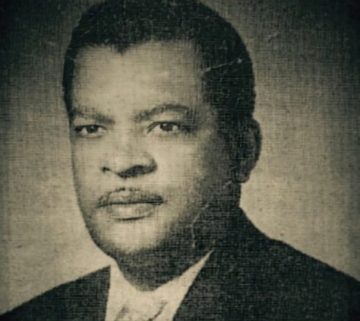ARTIST/BAND /GROUP INFORMATION
| Artist/Band/Group Birthday : | 03/05/1913(Age 111) |
Among the hundreds of songs interpreted, composed or adapted by Rodolphe Legros, Manman Nanotte is probably the favorite hit of several generations of Haitians. Its romantic and socio-economic characteristics have earned this song a special place in Haitian musical literature. Dodof was only 18 when he wrote this song; it was his first there.
Son of the seamstress, Desgrace Rémy and of the soldier, Dieudonné Legros, Dodof was the eldest of a family of ten children; six boys and four girls. They are, Rodolphe, Jean, Archibald, Richard, Raymond, Alexandre, Elvire, Bernadette, Anne Marie at Elia. The latter will marry André Pasquet, the father of Tico and Dadou Pasquet. According to what Richard Legros told me, a long time ago, it was André Pasquet, footbolleur who brought home a guitar. And Dodof used it to learn to play.
With Dormelas Philippe, Alexandre Legros and Dodof, the HH3W trio is born. This trio performed on the antennas of the radio station from which it bears the name. Since nothing can stand still, as Montaigne would have said, the trio changed their name and became Trio Haiti.
Of the Legros brothers, Raymond is probably the only brother who has not shown himself on records, on stage or on magnetic tapes. Jean, guitarist, conductor has rocked the Haitian population for a long time. He performed on Caraibes radio waves and in private homes with other musicians. He had a fairly rich repertoire; Gisèle, for example, was one of the gems he performed in the private parties he hosted. As far as I remember, Jean Legros had trouble with Antenor Bobo, (Ti Bobo), while his orchestra was playing at Deva in Cotes Plages. Bobo felt offended that he had not been invited by Deva to one of his festivities. If Jean Benjamin has had success with Gisèle, it is thanks to Jean Legros, Michel Pressoir told me. Gisele added Michel is the work of an unknown artist but, Jean Legros is the one who gave him this song to sing and subsequently, Edner Guignard requested it from him. The suite revealed Michel is notorious, Edner arranged it for the Riviera Hotel orchestra and Jean Benjamin. As for Alexandre and Richard, they evolved with Dodof in several performances and they were present when, for Mini Records in 1979, Gérard Dupervil interpreted the songs of Dodof. Sadly, Richard left for the Eternal East in May 2008. they evolved with Dodof in several performances and they were present when, for Mini Records in 1979, Gérard Dupervil interpreted the songs of Dodof. Sadly, Richard left for the Eternal East in May 2008. they evolved with Dodof in several performances and they were present when, for Mini Records in 1979, Gérard Dupervil interpreted the songs of Dodof. Sadly, Richard left for the Eternal East in May 2008.
While Port Au-Prince was putting on make-up and tourism began to develop as a kind of industry, engineer Robert Baussan, owner of the Ibo Lélé hotel proposed to Dodof to form a group to lead the inauguration of the hotel. ‘hotel. At this time, Dodof chose the best musicians he knew to form this group.
The group was composed as a suite, Ernst Lamy, piano, Félix Guignard, accordion, Victor Flambert, saxophone, Dormelas Philippe, bass, Yves Leurebours, castagnet, Richard Legros, bongo, Alexandre Legros, drum and Guy Durosier. It was this same orchestra which metamophosed into the Radio Commerce orchestra. This orchestra spent six years in Ibo Lele, from 1950 until March 1957.
Dodof belongs to a generation of musicians who gave a special place to Haitian folklore. His compositions and interpretations are characterized by a fairly pronounced folklore background. He traveled in the hills not only to commune with the peasants but also and above all in search of inspiration. Peasant declaration indicates Richard, the little brother of Dodof and Jacques, his son, in an interview with Emile Pierre in 1981, is one of the irrefutable proofs of his contacts with the peasants.
One day, said Richard, Dodof during one of his visits to the provinces asked a peasant the following question. What would you have said to a peasant woman if you courted her? The peasant answered in warm, loving terms, and Dodof liked the answer. In return, Dodof gave him fifty centimes. Thus, the Peasant Declaration was written.
Miss I love you
Pou nou mariye
Pou nou pa janm kite
Che Koukout I love you
Pounou jwi lavi’n
Jouskaske’n mouri
Rodolphe Legros lived in Port-au-Prince, his hometown until the age of 44. Having obtained a contract from Carlo Juste, owner of a nightclub in Montreal, called Perchoir d’Haiti, Dodof left Haiti in 1957 for North America where he stayed there for three years. He stayed there for a year at Le Perchoir, although he had great success, but financially he was disappointed.
He went to Cabaret Mont Martre in Saint Laurent where he hosted evenings with his group and the Johnny Reno Orchestra. Every Tuesday. The show of Dodof and its sequel was relayed by CGMS, a notorious radio station in Montreal.
In 1960, Dodof chose Brooklyn as his place of residence. At that time, there were few Haitian musicians in New York. In spite of everything, Dodof decided to form a small musical group for the third time to relax and externalize. On the drum was Richard, his inseparable brother, an accordionist whose name Richard has forgotten, and Dodof sang while he played the guitar. Incredible thing, but true; said Richard; this trio lit Long Island and its villages, despite the inexperience of the accordionist. It seems that the notoriety that Dodof enjoyed in Haiti and Montreal had followed him to the sanctuary of the Yankees.
Dodof returned to Montreal to perform with Jean Léon Destiné. As soon as he sang the first song on the program, he knew he had a problem. However, in mediocre ways, he performed the song. Having experienced the lukewarmness of the interpretation, he sang the piece again to repair certain mistakes made and make his audience happy. The next day he visited a doctor who wanted to hospitalize him because of a bleeding nose, but he refused. Immediately after, he took the bus to New York and as soon as he arrived in Brooklyn, he was hospitalized.
True star of Haitian song, at 18, he had already revealed himself as a young musician endowed with an extraordinary voice. It is not without reason that Guy Durosier immortalized him in ‘Si w al en Ayiti’. When waves of nostalgia highlight retro music, we think of Dodof and his team. This generation of musicians knew how to mix tenderness, compassion, laments of love, love of the land, ancestral rhythms to bewitch their followers.
Adrien B. Berthaud
Visits: 364

